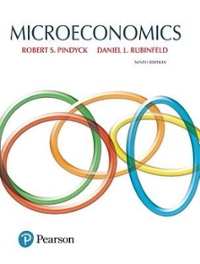Question
Problem 6: Public provision of public parks A small city consists of 2000 households. 1000 of the households are indoorsy, for each of which the
Problem 6: Public provision of public parks
A small city consists of 2000 households. 1000 of the households are "indoorsy," for each of which the monthly marginal benefit of public parks is given by MBI=4-Q (where Q is the number of parks in the city).The other 1000 households are "outdoorsy," for each of which the monthly marginal benefit of public parks is given by MBO=12-Q. Note that only positive values are reasonable for marginal benefits i.e. all "indoorsy" households will receive zero marginal benefits for any parks beyond the 4th, and all "outdoorsy" households will receive zero marginal benefits for any parks beyond the 12th. Throughout this problem, use a "continuous" not integer approach in sketching curves and evaluating relevant areas.
a. Write down an expression for this city's total marginal benefit from public parks, MB(Q). Keep in mind that as in familiar settings from a couple weeks ago there may be two parts to your "demand" curve.
b. Suppose it costs $6000 per month to maintain each park.What is the efficient number of parks for this community? What is the magnitude of the total benefits enjoyed by the community in this outcome?Illustrate your answer with a diagram.
c. Now suppose the city assesses each of its 2000 households a monthly tax equal to 1/2000 of the total costs of maintaining the number of parks you computed in part b). Will each household be better-off (by enjoying the parks, but also paying a proportional share of their costs) than they would be if there were no parks and no costs at all? Provide a numerical answer, for both indoorsy and outdoorsy households.
d. Describe a tax system by which city could raise enough revenue to fund the efficient number of parks (as you calculated in part b) and in which all households are better off than if there were no parks (and no costs) at all. Briefly discuss why this sort of outcome may be difficult to achieve.
Step by Step Solution
There are 3 Steps involved in it
Step: 1

Get Instant Access to Expert-Tailored Solutions
See step-by-step solutions with expert insights and AI powered tools for academic success
Step: 2

Step: 3

Ace Your Homework with AI
Get the answers you need in no time with our AI-driven, step-by-step assistance
Get Started


